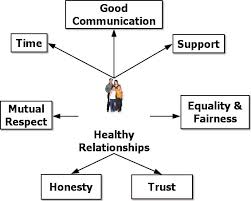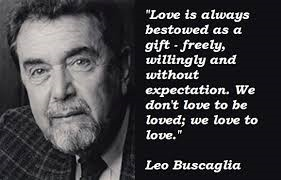There is much written on what a healthy relationship is not. We write and talk a lot about the traits – personality traits of those with mental health challenges and unhealthy relating and relationships. It is equally as important to be as informed as possible about the traits of a healthy relationship. As someone who has had toxic unhealthy relationships in the past (not in the last 15+ years) and who is now in a wonderfully growing and healthy relationship I hope that can do justice to this very tender and important topic. I also hope I can inspire those who may not yet know what a healthy relationship really is or the traits of said are and perhaps what patterns in their own lives are not helping them relationally I hope the reality that I, like many others, have grown from past hurt, pain, and mistakes, to learn how to be in a healthy relationship and contribute equally with equanimity and love in the relationship, will provide others with hope for themselves.
People can change their relational patterns, their relationships. But nothing magical will happen in the sense that there is just that one “right” “meant-to-be” person for anyone.
Before I get to the traits necessary – the ingredients really – for a healthy loving mutual relationship I’d just like to point out that before two people can build a healthy love, a healthy relationship, each must first know him or herself and each must like and have love and positive regard for him or herself and be a person that feels worthy and is open to the mutuality of consistent giving and receiving without fear of shame, being unworthy, fear of rejection or abandonment, and fully knowing that each foundation built, each bond and attachment created will at some time in one way or another, even if it is “death do you part” present not only challenges (opportunities for on-going growth) but also loss.
One of the most-needed ingredient in each person in healthy relationship is the ability to live not only trusting oneself, trusting one’s boy/girlfriend or partner but also trusting that they can deal with the ups, downs, challenges, and any loss that may come their way.
One of the core traits of a healthy relationship is the resilience that each person must bring to the relationship. Resilience refers to the ability of each person to bend, be stretched or challenged and recover readily with the communication, consistency of self, and have the emotional and rational compassionate flexibility to come back to centre and to compromise and to working things through in cooperative, respectful, and loving ways.
 Key traits of a healthy relationship besides resilience, self-trust, self-awareness, and independence, also include:
Key traits of a healthy relationship besides resilience, self-trust, self-awareness, and independence, also include:
1) Good communication skills – open and also respectful listening skills
2) Support – while fostering partner’s choices and decisions
3) Equality and Respect (fairness as in open to compromise)
4) Trust – of and for self and of other
5) Honesty – with self, and with other
6) Mutual Respect – that is not situationally dependent and that seeks no personal gain or advantage
7) Time – flexibility to negotiate what is needed for both people in the relationship without one compromising the other
8) Awareness of your own needs, wants, boundaries and self and the needs, wants, and boundaries of other
9) Effectively able to communicate boundaries respectfully and have flexibility with them when considering self and other
10) Being independent enough as a person to not need too much (out of balance) from partner
11) Emotional availability
12) Ability to be open, vulnerable, and patient
13) Realistic Expectations of other – not unrealistic or out-of-balance neediness
14) Loving Kindness even in disagreement
15) Deal effectively with your emotions when angry or hurt
16) Real Love versus toxic or emotionally immature or magical beliefs about love
What is Real Love?
Source:Psych Central by Susan J. Elliott
“Healthy people lead to healthy relationships and healthy relationships lead to real love.
Real love does not seek another person to fill up what we are lacking. It takes a complete, whole person to really love and overly needy people cannot do it. Real love is balanced. Both partners love in fairly equal amounts. While the balance may shift back and forth, it is not lopsided. If you love someone who is not loving your back, or not loving you the way you love them, then it’s not real.
When you place expectations on people to fill your empty places, that is not healthy. It’s nice to have a partner, a companion, someone to help you weather life’s storms, but it is not okay to look for someone to complete you or fix your broken places. That is not real love; that is dependence, co-dependence, and unhealthy neediness.” – Source:Psych Central
 Love has been defined by not only many who are experiencing it or have experienced it but by many who have also studied it.
Love has been defined by not only many who are experiencing it or have experienced it but by many who have also studied it.
Healthy relationships have at their core, on the part of each partner, real love, healthy love. What that is and really means is for many elusive for a time or a lifetime.
From his book, The Road Less Traveled, M. Scott Peck, writes:
Peck seeks to differentiate between love and cathexis. “Cathexis is what explains sexual attraction, the instinct for cuddling pets and pinching babies cheeks. However, cathexis is not love. All the same, true love cannot begin in isolation, a certain amount of cathexis is necessary to get sufficiently close to be able to truly love.
Once through the cathexis stage, the work of love begins. It is not a feeling. It consists of what you do for another person. As Peck says in The Road Less Traveled, “Love is as love does.” It is about giving yourself and the other person what they need to grow without doing for them what they need to do for themselves and without seeking to change or rescue them in any way. It is about truly knowing and understanding them.
It is also about accepting them. Real love, healthy love make it possible to foster this nurturing understanding because no one attacks the other or withdraws from the other or demands too much of the other for their own selfish gain, neediness, or any other reason. M. Scott Peck also defined loved as, “hard work and honesty.”
 Leo Buscaglia also wisely said, “Never idealize others, they will never live up to your expectations. I would add that the healthiest of love seeks to not have expectations but rather to be as unconditional an expression of positive regard that is unwavering consistently given without the expectation of receiving anything in return. Love does not keep score. Love should be a soft place to land. Love must be mutual. Unrequited love is not a covenant of or commitment to a real and healthy love that is mutual or reciprocal or two-way. To its betterment or not Love is most likely influenced by both biological drives and cultural influences and since no one is perfect our love as healthy as we strive for it to be cannot be perfect. However, this does not mean there is not a wide gap between truly healthy love as a central ingredient and trait of healthy relating. Love does not demand. Love is not given to get. Love is given because it is.
Leo Buscaglia also wisely said, “Never idealize others, they will never live up to your expectations. I would add that the healthiest of love seeks to not have expectations but rather to be as unconditional an expression of positive regard that is unwavering consistently given without the expectation of receiving anything in return. Love does not keep score. Love should be a soft place to land. Love must be mutual. Unrequited love is not a covenant of or commitment to a real and healthy love that is mutual or reciprocal or two-way. To its betterment or not Love is most likely influenced by both biological drives and cultural influences and since no one is perfect our love as healthy as we strive for it to be cannot be perfect. However, this does not mean there is not a wide gap between truly healthy love as a central ingredient and trait of healthy relating. Love does not demand. Love is not given to get. Love is given because it is.
According to social psychologist Zick Rubin, love is characterized by three different things: attachment, caring and intimacy. Healthy love reflects the best of a person’s attachment, caring, and capacity to trust self with intimacy and the accompanying vulnerability with other.
Love is a deep feeling of affection that is not interrupted by the ebb and flow of life. Love can be between friends. Love between intimate partners is a deep romantic and sexual attraction for another that includes an interdependent sharing of equanimity between self and other and is returned by another because they have it to give and show the action of love without personal gain. Love is not conditional. Love is not about giving what you get or not. Love is loving in consistent action and kind respect because one wants to give this gift of healthy love.
The traits that are integral parts of what a healthy relationship is have at the sum total of their core, real, honest, love consistently given – attachment, caring, and intimate – not conditional and not to get filled up by another and in no way is this real honest love at the heart of healthy relationships ever about trying to live through another or demand needs not met in childhood for another. That is not healthy love, that is neediness.
As people grow and change and gain more experience with relationships and love the hope is they, as I now I have experienced learn from all relating and aspects of love tried, and love at times failed and love that feel short of healthy to get to that place inside where one has healthy love for one’s known self and for others and especially for the one that one falls in love with and cherishes as a partner.
Do your work, learn from your mistakes, keep being open to learning (as am I) so that you too, if you don’t already might experience the wonderful awesome, difficult to describe love of and for another that just takes your breath away. It can take some longer than others to find this healthy relational love. It is well worth the time and effort to put one’s own house/self in order to be able to experience healthy relational love and not the toxic, competitive, jealous, often demanded, unrequited love that is painful.
Healthy love does not hurt. Love should never hurt.
© A.J. Mahari, December 17, 2014 – All rights reserved.

